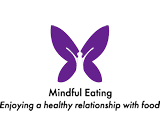Mindful Eating Habits: Improving Your Eating Long-Term
Many people are eager to lose weight and go on diets where they follow diet ‘rules’, focusing on what to eat, what to avoid and calorie allowances, but they don’t necessarily get support in addressing any underlying, problematic eating habits. When addressing our eating habits it’s important to consider our thought processes (or absence of), which can influence our eating behaviours, as well as being aware of how we’re feeling (see my blog post ‘Understanding Emotional Eating’). To make positive changes we need to build self-awareness and self-understanding to become more aware of how we currently behave, and what drives those behaviours, so that we can find strategies for change. Setting up, regularly practising and embedding new mindful eating habits can help us to make significant, long-term changes to our eating habits.
Replacing Old, Automatic Habits With More Mindful Eating Ones
 Rather than simply relying on diets to lose weight, which often only have short-term effects, it’s more important to focus on your actual eating habits and relationship with food. There might be a handful of habits that are repeatedly getting in the way of you feeling in control of food and achieving successful long-term weight management. Habits can be very deeply ingrained, but that doesn’t mean we can’t ‘undo’ them and replace them with more helpful ones. Like old habits, these new habits need to become automatic, like cleaning your teeth, so you don’t have to keep thinking about them. The brain likes to operate in automatic mode as much as possible, which is why we can get stuck in the rut with the same old bad habits. It requires mental effort to think about what to eat each day, so setting up and practising some mindful eating habits that, over time, become natural and automatic, can enable us to eat better whilst reserving our energy for other things.
Rather than simply relying on diets to lose weight, which often only have short-term effects, it’s more important to focus on your actual eating habits and relationship with food. There might be a handful of habits that are repeatedly getting in the way of you feeling in control of food and achieving successful long-term weight management. Habits can be very deeply ingrained, but that doesn’t mean we can’t ‘undo’ them and replace them with more helpful ones. Like old habits, these new habits need to become automatic, like cleaning your teeth, so you don’t have to keep thinking about them. The brain likes to operate in automatic mode as much as possible, which is why we can get stuck in the rut with the same old bad habits. It requires mental effort to think about what to eat each day, so setting up and practising some mindful eating habits that, over time, become natural and automatic, can enable us to eat better whilst reserving our energy for other things.
Becoming A More Mindful Eater
 Becoming a more mindful eater can help you become so much more aware of your current eating habits- all you need to do is engage the brain a bit more! So many of us eat on autopilot. Examine your eating habits and become more mindful of the food options you have, rather than just diving in to the same old food choices. Think about not only what to eat, but the eating process itself. A retrospective analysis can also be very helpful- we can often see things more clearly if we look back on them, and this involves asking yourself questions such as ‘Why did I eat that?’ ‘Who or what influenced my food choice?’ ‘How do I feel since eating that?’. Some useful thought processes and actions on which you can start creating new mindful eating habits include:-
Becoming a more mindful eater can help you become so much more aware of your current eating habits- all you need to do is engage the brain a bit more! So many of us eat on autopilot. Examine your eating habits and become more mindful of the food options you have, rather than just diving in to the same old food choices. Think about not only what to eat, but the eating process itself. A retrospective analysis can also be very helpful- we can often see things more clearly if we look back on them, and this involves asking yourself questions such as ‘Why did I eat that?’ ‘Who or what influenced my food choice?’ ‘How do I feel since eating that?’. Some useful thought processes and actions on which you can start creating new mindful eating habits include:-
Based On What To Eat, How Much To Eat, And Whether To Eat:-
- What size portion of this food is best for me at this time? (eg if it’s very high calorie, or you’re not very hungry, going for a smaller portion)
- Am I actually hungry?
- How will I feel if I eat this? (physically and psychologically)
- Will it taste as good as it looks? (or is this just ‘eye hunger’)
- Will this particular food choice keep me going?
- Being more discriminating with foods- eating what you really want to eat (whilst considering nutritional content too) and passing on the rest
- Planning in advance what to eat to avoid poor, spontaneous decisions in the moment
- Do I want to eat all this myself? Perhaps I could share it? (eg a dessert)
- Not eating something just because it’s in front of you.
Based On The Eating Process Itself:-
- Eating with no distractions (we tend to eat more when distracted, eg watching TV, on the phone)
- Focusing on current mouthful rather than focusing on scooping up the next fork load
- Not ploughing through your food- slowing down (slower eating linked to healthier weight)
- Am I full? (Is it time to stop eating?)
- Noticing when you’re eating/about to eat something based on non-physical hunger, eg eye hunger, boredom hunger, reward hunger
- Chewing well (can result in fewer calories eaten)
- Not eating from a large packet but from a small/medium bowl or plate instead (and buying smaller packets).
Becoming A More Intuitive Eater
 Alongside developing some mindful eating habits, it can also be really helpful to work on becoming a more ‘intuitive’ eater- this means eating more in accordance with internal cues such as hunger, knowing exactly what you want to eat in any moment, and knowing how much your body wants to eat. This is in contrast to external cues such as eating according to the clock, food advertising, the sight or smell of food or a diet book that tells you what to eat and how many grams of something to eat.
Alongside developing some mindful eating habits, it can also be really helpful to work on becoming a more ‘intuitive’ eater- this means eating more in accordance with internal cues such as hunger, knowing exactly what you want to eat in any moment, and knowing how much your body wants to eat. This is in contrast to external cues such as eating according to the clock, food advertising, the sight or smell of food or a diet book that tells you what to eat and how many grams of something to eat.
Awareness is power, and it can enable us to make positive changes. If you can engage the brain a bit more and adopt some new mindful eating techniques, and keep practising them, over time they should become automatic and natural, and you won’t have to think about doing them anymore. That way, in contrast to just going on yet another diet, you’ll be in a far better position to eat more healthily, lose weight and keep it off long-term. Read my blog post: ‘What is Mindful Eating?’.
For more information about how I work with clients, see ‘Services‘.
One-to-one sessions: buy three sessions up front and get a 4th sessions FREE! Contact me HERE.
Online Talks: click HERE for latest topics and dates.
Want to find out more? If you feel you could benefit from my service and would like a chat first, give me a call (Emma Randall) on 07961 423120, or email me. I’m based in Lightwater, Surrey and offer online sessions via Zoom.

